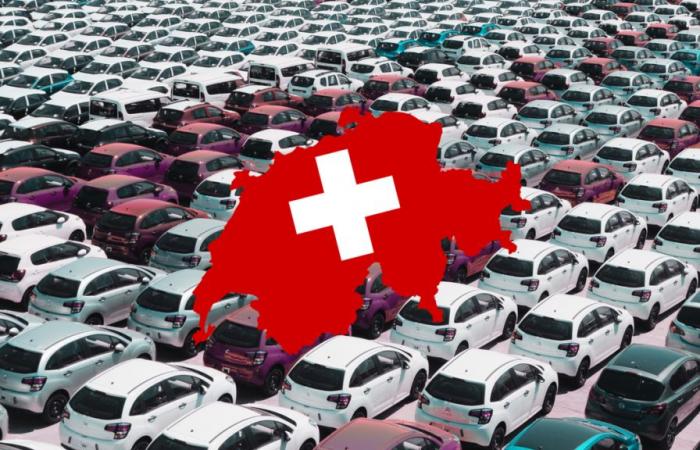In Switzerland, the automobile trade is booming, including its dubious aspects. Serious mechanics denounce the increasingly brazen practices of their criminal competitors.
Henry Habegger / ch media
In Switzerland, the sector is plagued by fraudulent practices, as evidenced by the arrest of an apparently uneventful automobile expert. Former municipal councilor and inspector at the Touring Club Suisse (TCS) in Bernese Zealand, this man, described as a rather discreet father, was arrested on October 25, 2023 as part of an intercantonal operation.
Indeed, this man, previously blameless, would have been involved in massive fraud. The investigation carried out by the Zurich public prosecutor’s office revealed that he would have fictitiously validated 1,332 vehicles in poor condition between 2010 and 2023, in exchange for bribes or financial advantages. According to the Zurich public prosecutor’s office, the case involves “nearly 30 suspects aged 28 to 61,” from Switzerland, Syria, Iraq, Pakistan, Sri Lanka, Turkey and Slovakia.
Among them are a car expert, several dealers and private owners. These acts allegedly took place in the cantons of Solothurn, Bern, Aargau and Zurich. We also learned in December that the Solothurn public prosecutor’s office had neglected to investigate for several years. But that’s not all since a TCS administrative employee could also be involved. The investigation into these damaged vehicles reveals a well-oiled system.
A doubtful boom
The used vehicle trade is attracting more and more criminal networks. Respectable mechanics complain about unfair competition from these dubious actors. According to figures from the Federal Statistical Office (FSO), the number of car dealerships increased from 1,230 in 2011 to 2008 in 2022, an increase of 63%. Full-time headcount followed a similar trend, increasing from 2,840 to 4,356 employees, an increase of 53%.
In comparison, the number of cars registered in Switzerland only increased by 13% over the same period, reaching 4,721 million in 2022.
Switzerland, a paradise for money laundering
Why such a gap between dealership growth and car growth? For professionals in the sector, the answer is simple, Switzerland is a “money laundering haven”.
“In Switzerland, you can pay up to 90,000 francs in cash, without anyone asking any questions. In Europe, this would be unthinkable. Here you just have to deposit the money in the bank with a simple receipt. No one asks where it comes from.”
A mechanic
According to another professional, newcomers to the sector buy garages after only two years of activity, a financial feat that is difficult to explain without recourse to money laundering. “Money from prostitution and drug trafficking passes through cars before ending up in real estate”continues a veteran of the sector. Some dealers display hundreds of cars, a situation impossible to finance legally. The criminals then invest in buildings, often renovated under the table by foreign workers who come temporarily for paltry wages so that the money can be laundered.
“They work for three months for a pittance, but the building is renovated, the money from car traffic is laundered”
A well-informed witness
-Questionable practices and corruption
These networks also corrupt salespeople at large dealerships. “They offer between 200 and 500 francs per car to get advantageous prices”reveals a fine connoisseur. These cars are often overhauled in a hurry and are “only made up to appear in good condition,” explains a mechanic. As a result, honest professionals struggle to access the second-hand market, dominated by these unscrupulous players. Which does not seem to interest the Swiss tax authorities.
“They don’t act because these people are very good taxpayers, as they say”
Accuses a mechanic
Another ploy is to provide an overvalued invoice for vehicles sold. For example, a customer buys a car for a price lower than that indicated on the invoice. This difference allows the seller to launder money, while artificially increasing the insured value of the vehicle. Another technique consists of installing new parts to pass the technical inspection, before then dismantling them to resell the vehicle at a high price.
Large companies power the system
Large automobile groups also favor these practices. They sell their used vehicles via online auctions reserved for mechanics. “Those who win these auctions often pay exorbitant prices, which are impossible to legally make a profit,” explains a mechanic.
Insurance companies are not left out. An example: a motorist in Switzerland destroys his 300,000 franc Ferrari. The insurance recovers the wreck, which a foreign buyer, for example in Poland, buys back for 30,000 francs. This same car is then “cloned” using data from a similar vehicle stolen in Germany. It is then resold in Switzerland under a false identity.
“Today, insurance companies regularly receive the highest offers for car wrecks from abroad”
A dealer
Unfortunate consequences for motorists
These questionable practices can have serious consequences. In May 2021, on the A1 motorway, the left front wheel of a Land Rover came loose. Fortunately, the driver was able to avoid an accident. The vehicle came from an Albanian garage linked to a criminal network.
For an experienced mechanic, the solution involves a reversal of the burden of proof: sellers must prove the legality of their income. This model is used in Italy to fight against the mafia and could inspire Switzerland. Currently, it is the authorities who must demonstrate the illegal origin of the funds. An approach which, according to some, promotes impunity for criminals.
(Translated and adapted by Chiara Lecca)




